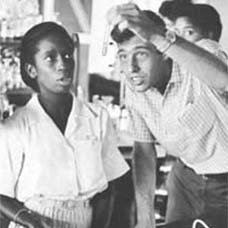
More Water Bottles, Fewer Bullets: John F. Kennedy's decision to create the Peace Corps was in some ways a showy bit of public diplomacy, but its core of idealism and commitment survives to this day
More Water Bottles, Fewer Bullets
By David Ignatius
The Washington Post
January 4, 2005
The picture on the front page of Monday's New York Times captured the essence of America's challenge in 2005: It showed the crew of a U.S. Navy helicopter handing out bottled water for poor villagers in a Muslim region of Indonesia that was devastated by the tsunami.
That image of American power solving problems, multiplied a thousand times over by similar acts of generosity, is the best antidote for our country's global difficulties. We talk often these days about an "exit strategy" from Iraq. But the truth is that we need a better "entry strategy" into the lives and welfare of people around the globe. The way out of our current predicament, paradoxically, is to become more connected with the world, not less.
I hope President Bush realizes how much it matters that the world sees the American military handing out water bottles rather than firing M-16s. By increasing U.S. aid for tsunami victims twentyfold over what the administration had first pledged, Bush seemed to be acknowledging that, initially, he blew it. The United States may not have been "stingy," as a United Nations official charged, but the administration missed an opportunity to show the nation's generosity.
America's commitment needs to be dramatic, and intimate - powerful enough to cut through thousands of hours of negative programming on al-Jazeera. Personally, I'm glad the president sent his brother Jeb to visit the stricken areas, and not because of his experience dealing with hurricanes as governor of Florida. I'm glad because in any culture, sending a member of your family is a personal way of saying that you care.
Americans think of themselves as an idealistic and generous people. So it's hard for us to understand that in recent years, much of the rest of the world has begun to form a different impression. Polls show that the United States is increasingly unpopular around the world -- regarded as arrogant, militaristic and selfish. The terrorist Osama bin Laden has gotten higher favorability ratings in some Muslim countries than President Bush. We may think those poll findings are unfair - outrageous, even - but that indignation doesn't do us any good. The task for America's leaders is to turn those perceptions around.
An unpopular America has to seize every opportunity it can - to "walk the walk" about our values, instead of just talking the talk. It's a moral duty, but it's also a national security requirement. President Kennedy realized that America could best counter communist-led insurgencies in the Third World by making a dramatic commitment to improving the welfare of those in poverty. John F. Kennedy's decision to create the Peace Corps was in some ways a showy bit of public diplomacy, but its core of idealism and commitment survives to this day.
A similar mingling of moral purpose and pragmatic interests motivated the American missionaries who transformed the Arab world in the 19th century. They created American universities in Beirut, Cairo, Istanbul and other cities that, in turn, created a bedrock of goodwill that supported American power in that part of the world. I sometimes think the only thing that kept America going in the Arab world during the past 50 years was that nearly every influential Arab family - Baathist bomb thrower or Bedouin oil sheik - had a personal link to the American University of Beirut.
That's why the images of the U.S. military dispensing humanitarian aid are so important. They show a reassuring American face. A friend sent me an e-mail this week with a Dec. 29 dispatch from the Pentagon's Armed Forces Press Service, detailing the quick response by the U.S. Pacific Command to the Dec. 26 tsunami. An aircraft carrier task force was immediately diverted from Hong Kong to the Gulf of Thailand, and a Marine expeditionary force in Guam for a port visit began steaming toward the Bay of Bengal. This is the sort of thing America is good at: organizing the logistics to help people when trouble strikes. The more of it we do, the better and safer we'll be in the long run.
So here is a resolution for the New Year: Let's try to act as if every week brought a humanitarian crisis to the world's poor. The scale of the past week's devastation is stunning, but so is the slow, grinding toll of everyday disease and malnutrition. Let's give back to the world more of America's idealism, and less of its bombs and bullets. Let's try to live as if America's future security depends on our ability to connect with what we too often dismiss as "the rest of the world." Because, in fact, it does.










